Happy tax day, Daily Grindhousers! For our non-American readers, April 15th (or April 17th, as it falls this year) is the deadline for residents of the United States of America to file their annual income taxes, where a portion of our earnings gets set aside for infrastructure, health care, social safety nets, defense, the occasional payoff of a sexual harassment lawsuit from a congressman, and funneling into the properties of our current president. All good, useful things that keep our country running!
“Death and taxes” are joked to be inevitable parts of life, and while the former has been depicted in various mediums countless times in the course of history, the latter has mostly been relegated to the subplots of larger tales. Roman tax collector Zacchaeus gets a nice little mention in the Gospel of Luke, but he never got his own spin-off novel, Samuel Adams had a beer named after him, but he was, notably, not very good at being a tax collector, and Frank Wilson’s investigations may have led to Al Capone being taken down, but the best he had was inspiring a character played by Charles Martin Smith in THE UNTOUCHABLES. Taxes, it seems, are just not glamorous enough to warrant a central focus.
There are, however, a few exceptions to this rule, and every so often, filmmakers decide that tax evasion is a subject worthy of a feature. These so-called “Taxploitation” films (so-called by this column, and this column alone) may be few and far between, but they certainly deserve at least a minor footnote in the world of cinema. A very minor one. Like, probably no more than this column.
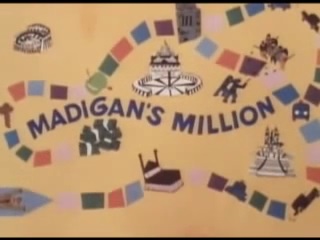
One of the first Taxploitation films is 1966’s MADIGAN’S MILLION, which has a number of curious attributes going for it. For one, it’s an Italian-Spanish co-production of a screwball comedy directed by blacklisted American actor Stanley Prager. For another, it ended up distributed in the U.S. by American International Pictures, and thus ended up in Troma’s catalogue, where it stands today. Finally, it’s the first film made that stars Dustin Hoffman, even though it ended up not getting released until after THE GRADUATE had made him a star.

MADIGAN’S MILLION is about as entertaining as you’d expect from an Italian-Spanish screwball comedy from an American director about tax evasion. Hoffman does his best as a bumbling treasury department employee tasked with going to Rome to determine what happened to the money owned by a retired American mobster (second-billed Cesar Romero, who dies before the opening credits), and the film is less insufferable than a Franco & Ciccio vehicle, but the jokes rarely land and it ends up feeling like a sub-PINK PANTHER with a couple amusing moments.

The Taxploitation genre wouldn’t really take off until 1981, when HARRY’S WAR hit theaters.
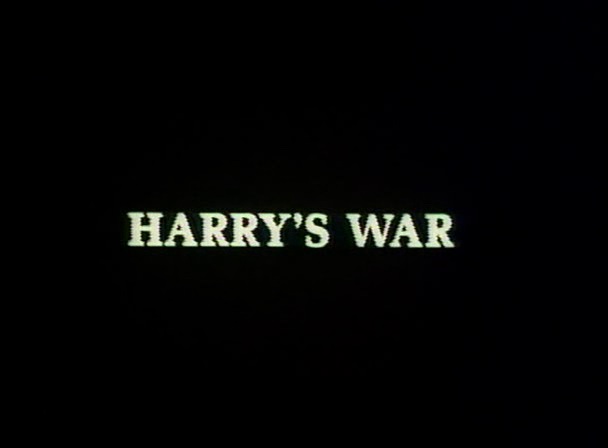
Arguably the best known of the Taxploitation films (not to dissimilar from being “less insufferable than a Franco & Ciccio vehicle), HARRY’S WAR stars the ever-welcome Edward Hermann as Harry, a post office employee who comes to the assistance of his old friend Beverly (Geraldine Page) who runs a junkyard and antique store filled with Russian cobalt bombs. Beverly, as it turns out, has a tax bill of $192,654 with the amount arrived at due to very questionable means as IRS agent Ernie (the late David Ogden Stiers) has it out for the old gal.
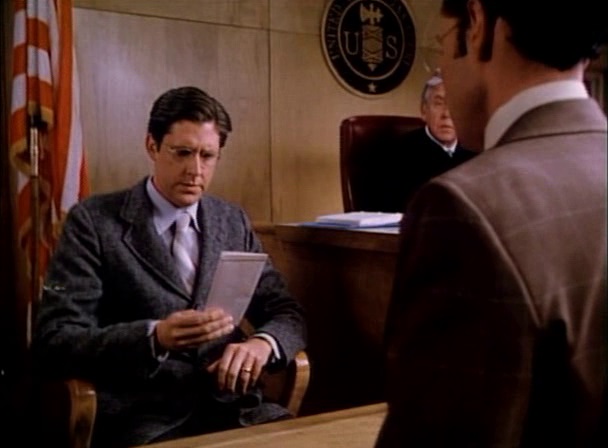
After battling the taxes in court literally kills Beverly, Harry, the beneficiary of her will, is stuck with the bill and a vendetta against the IRS after the government seizes her property. So Harry does what any rational person would do – he rams a military vehicle into a talk show studio, holes up in the heavily-armored locale and declares war on the IRS. (Seriously, he declares, “I declare war on the IRS!”)
Written and directed by Kieth Marrill (who had previously helmed the Lorenzo Lamas wrestling pic TAKE DOWN), it’s not too surprising that HARRY’S WAR has ended up a favorite of libertarian cinephiles, who latch on to the film’s anti-government, anti-taxing, pro-blowing stuff up message. Some of the reviews I’ve come across even seem to suggest a conspiracy against keeping the film, an obscure barely-released comedy with no A-list stars that has been released on VHS twice, DVD twice, and turns up on Netflix and Amazon Prime frequently, available to the public. It’s one man against THE MAN!
The problem is that, outside of the solid performances, HARRY’S WAR doesn’t really have much to offer. There’s a subplot about Harry getting his wife back, as the two seem to be on the verge of divorce because Harry is weak-willed or something, which is remedied when Harry’s wife is now suddenly attracted to him because he’s in military garb, to the point of bringing their two children in to a war zone to support him. Beverly seems like a conceptually-interesting character, spouting off conspiracy theories and feeding those in need, but she’s given kind of the short shrift narratively and the film can’t seem to decide if she’s supposed to be seen as a kook or not.

The tax aspect the film makes even less sense, as while Harry does start out with a few valid points about tax code (it’s complicated, and the process of resolution is often unfair and at the whims of those involved), it quickly descends into Harry just yelling about taxes and the IRS agents involved looking like fools. Even the final climax, where Harry supposedly “wins over” the public (whom we never see), relies on an argument that doesn’t hold any water when he attempts to question if the IRS is above the Constitution – a document that arguably created the IRS in the first place.
In the end, HARRY’S WAR is a lot of yelling about things that start as a conceptual idea worthy of discussion and then, before any discussion could be had, moves into irrational idiocy. It’s oddly appropriate that the lead character is named “Harry Johnson” – there’s clearly the intent to set him up as sounding like an everyman that the audience can identify with, but due to a lack of understanding the context, he just ends up sounding like a dick.

It’s not shocking, then, that HARRY’S WAR failed to ignite a string of Taxploitation copycats, but eight years later, two comedies centered around taxes emerged onto (a very limited amount of) video store shelves. (These were perhaps inspired by THE BLUE IGUANA, the 1988 neo-noir in which IRS agents, played by Dean Stockwell and Tovah Feldshuh, hire detective Dylan McDermott to get the secret money hidden by ex-pat Jessica Harper, which is reason enough for any self-respecting DG reader to check it out.)
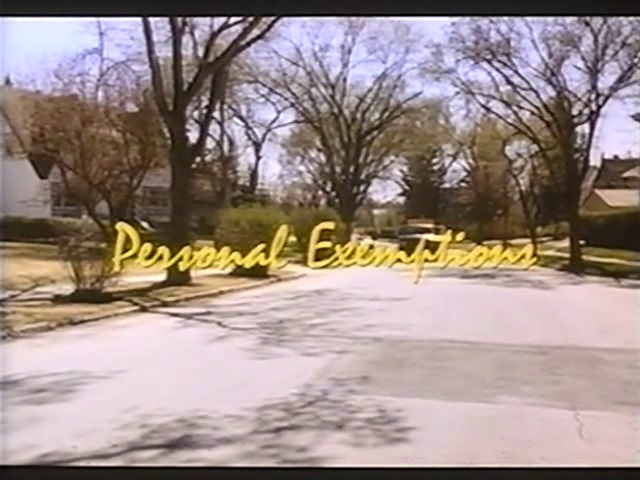
PERSONAL EXEMPTIONS (aka THE MCFALLS) takes exactly the opposite tactic of HARRY, telling the story of a dedicated IRS investigator determined to get to the bottom of things. Nanette Fabray stars in her second-to-last film (she’d later be part of the gen-X crime flick TERESA’S TATTOO) as Mildred McFall, an investigator on the verge of retirement and dealing with her rudimentary wacky family.

Though, as far as ‘80s comedies go, they’re not all that wacky. Her daughter, currently in a relationship with a cop, has a tendency to house undocumented immigrants. Her husband, who has also recently retired after serving as an attorney, is bored. And her son is a marketing exec frustrated because all of his clients get pissed off at his mother, who has obnoxious children and an overbearing wife.
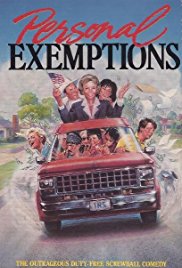
That’s pretty much PERSONAL EXEMPTIONS in a nutshell, a lighthearted comedy that doesn’t really offer much beyond Nanette Fabray having vague thoughts about having prioritized career over her family, with occasional racist humor involving the daughter’s Mexican residents putting on a cockfighting ring. The oddest thing about PERSONAL EXEMPTIONS is that it exists at all – why the Canadian producers decided that a low-key comedy about an IRS agent would make big bucks on the video market is beyond me. (It was produced too late to take advantage of Canada’s tax laws involving films, which is a shame, as a movie about an IRS agent produced as a tax dodge would be some great irony.) It does, however, have a great theme song, and it would be the only movie theme song to directly reference tax accounting if it weren’t for the same year’s TAX SEASON.
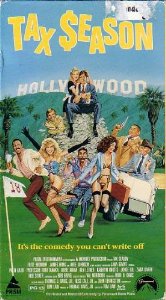
TAX SEASON has a little bit more manic energy, revving up the screwball antics in the POLICE ACADEMY mold and setting them in that wild, crazy land of tax accountants.
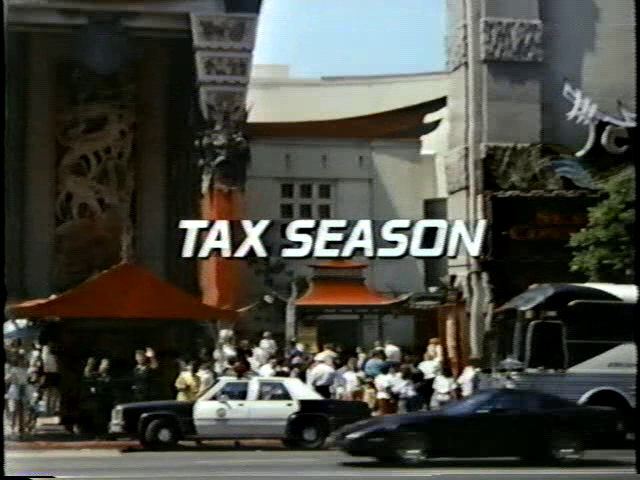
I wrote excessively about it a few years back, and I won’t go into too much detail again, other than to say that no film with James Hong is a complete waste of time.

It’s a passable time-waster, but it misses out on the potential of an accountant-based POLICE ACADEMY (as much potential as that would be) by completely abandoning most of the cast halfway through the film.

Neither TAX SEASON nor PERSONAL EXEMPTIONS did much for tax comedies, but that didn’t stop director Ben Moses from taking another stab at the genre a few years later with 1992’s NICKEL AND DIME. Another lighthearted comedy with a little bit of crime in there for good measure, NICKEL AND DIME’s greatest attribute is the casting of Wallace Shawn as a tax accountant, a decision that’s likely among the most on-the-nose casting in film history.
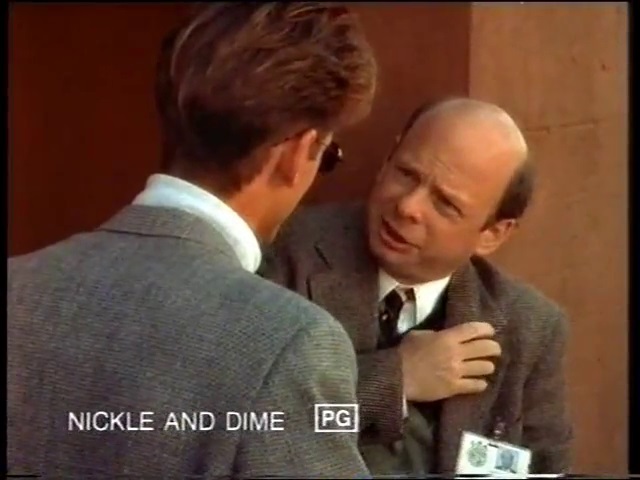
Shawn certainly brings his tax accountant-y best as Everett, a virginal, by-the-books accountant who has a passion for old music and longs to prove himself to his uncle, the owner of the accounting firm. Everett is assigned the troublesome case of Jack Stone (C. Thomas Howell), a private detective who specializes in finding heirs for clients who have died in order to prevent their estates from going to the government. Jack is sleazy! Everett is bookish! Can these two mismatched partners get along while they investigate the case of a missing heiress and Everett determines how Jack is going to pay off all of his back taxes?
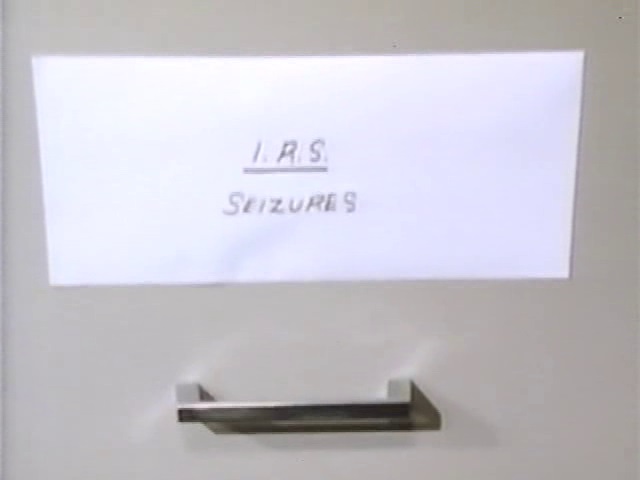
I’d hesitate to call NICKEL AND DIME a good movie, but it’s more entertaining than it should be, thanks to the actors involved. Shawn manages to embrace the cliché of his character to the point where Everett becomes human, and Howell makes for an affable lead. The pair is almost charming enough to forgive the plot, which skitters around like a pinball and doesn’t make a heck of a lot of sense in retrospect, but it’s not too surprising that a PG-rated comedy about a tax accountant starring C. Thomas Howell and Wallace Shawn hasn’t made it past a VHS release. (Though, it could also be a conspiracy!)

The Taxploitation genre petered out at this point, with only 1998’s Joe Pantoliano thriller TAXMAN to claim as its own, but with Tax Day coming once a year, the return of another tax-based comedy is just a matter of time. That’s something I’m as sure of as the inevitability of death and… er, the other thing.
- JIM WYNORSKI RETURNS WITH THE CREATURE FEATURE ‘GILA’ - May 1, 2014
Tags: America, American International Pictures, C. Thomas Howell, Canada, Cesar Romero, David Ogden Stiers, Dean Stockwell, Dustin Hoffman, Dylan McDermott, Edward Hermann, Elisha Cook, Geraldine Page, Hell, Holidays, Italy, James Hong, Jessica Harper, Joe Pantoliano, Money, Movies, Nanette Fabray, Noble Willingham, Reed Smoot, Spain, Stanley Prager, Taxes, The 1960s, The 1970s, The 1980s, The 1990s, The IRS, Tovah Feldshuh, Troma, Wallace Shawn

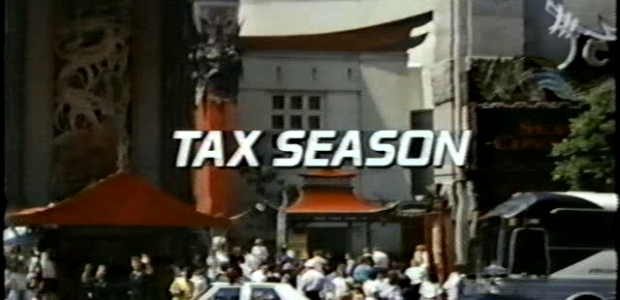

No Comments